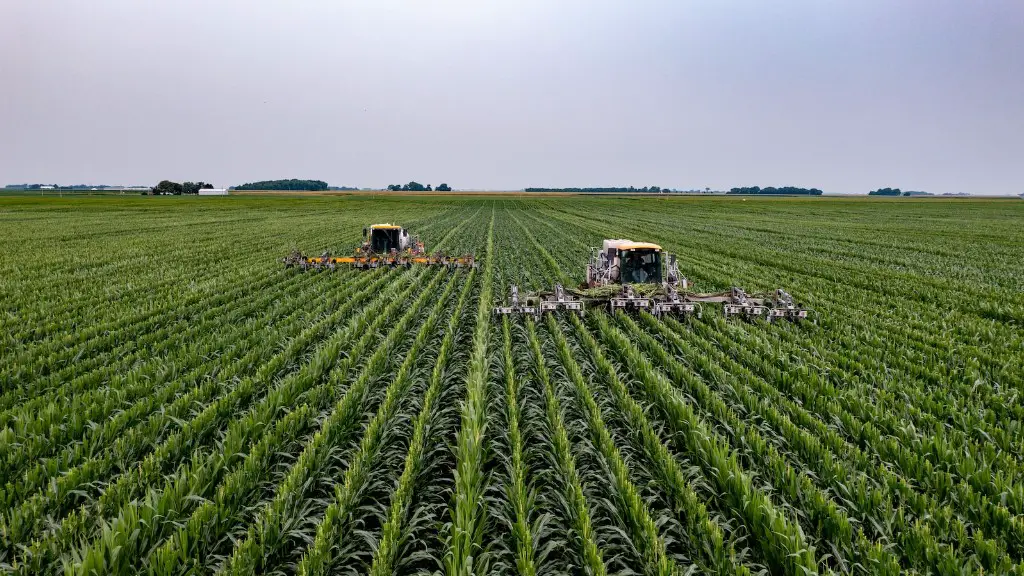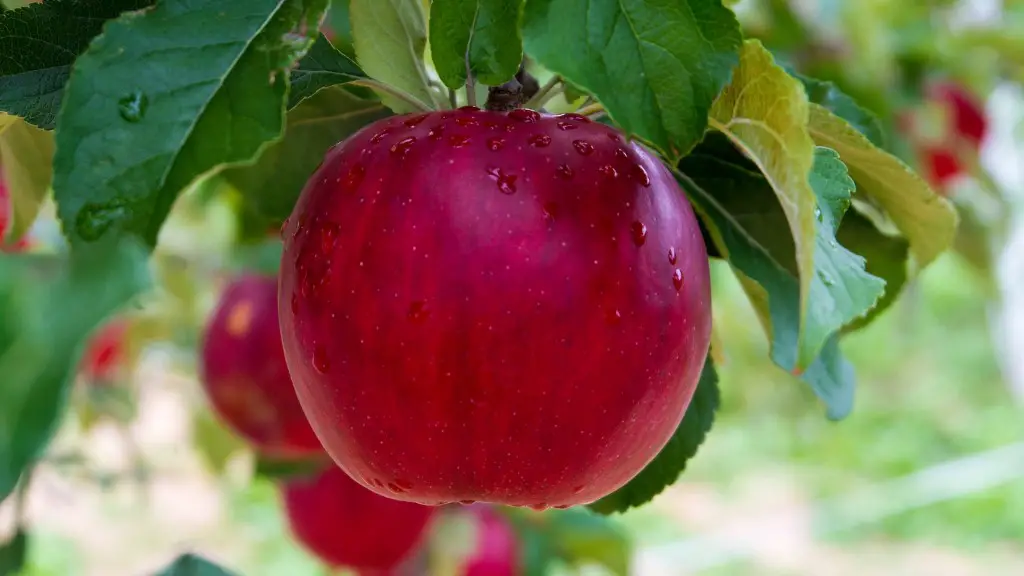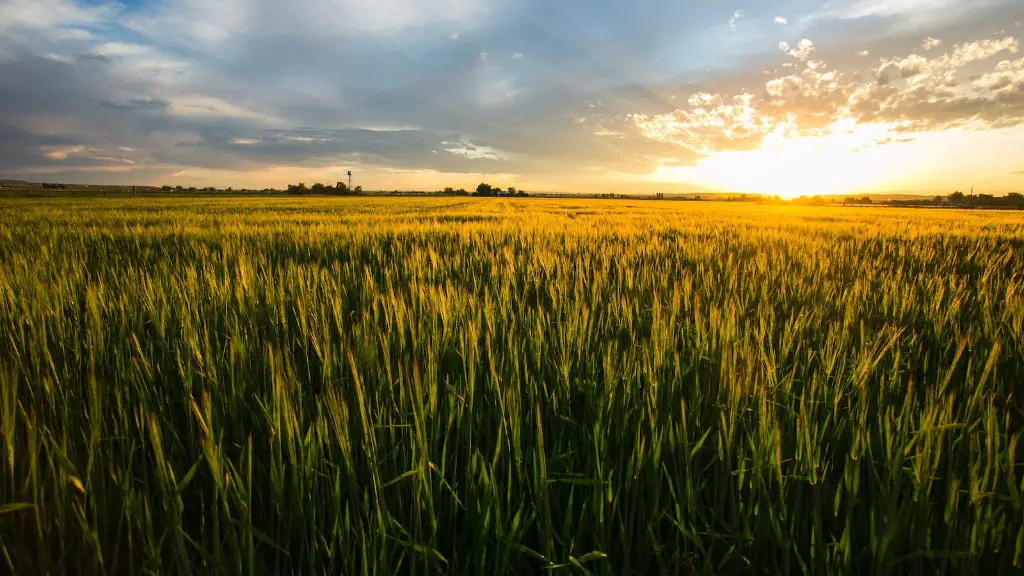Sustainable agriculture is an alternative to industrial agriculture. It focuses on environmental stewardship, social responsibility, and economic prosperity. It is often viewed as a more expensive form of agriculture, leading to questions about whether the cost is worth it. So, is sustainable agriculture more expensive?
To answer this question, it is important to consider the true cost of industrial agriculture. Though often cheaper up front, this approach can be costly in the long run. Industrial agriculture has been linked to soil degradation due to monocropping, overuse of fertilizers, and poor agricultural practices. These practices can lead to soil erosion, water contamination, and other environmental issues that can be costly to address. On the other hand, sustainable agriculture is designed to reduce environmental costs by emphasizing soil health, biodiversity, and natural resource management. This approach can reduce the long-term costs associated with industrial agriculture.
In addition to environmental costs, there are economic costs associated with industrial agriculture. This system often relies heavily on pesticides and other chemicals, which can make it more expensive for farmers to produce crops. In contrast, sustainable agriculture uses crop rotation and other techniques to maintain healthy soil, reduce the need for pesticides and chemicals, and increase crop yields. This can reduce costs for farmers and result in higher profits.
It is also important to consider the non-monetary costs of sustainability. While sustainable agriculture may be more expensive in the short term, it has the potential to benefit society in the long run. Organic and sustainably produced foods are often healthier and more nutritious than their industrial counterparts. They can also help build social and economic relationships between farmers and their local communities, reducing poverty and creating healthier food ecosystems.
Overall, sustainable agriculture may be more expensive in the short run, but its long-term benefits can far outweigh its costs. Sustainable farming can lead to healthier soils, fewer environmental hazards, increased crop yields, and healthier food choices. The benefits of sustainable agriculture cannot be denied and should be seriously taken into consideration.
Environmental Benefits
Sustainable agriculture offers numerous environmental benefits, including.. Reduced pollution and the use of fewer pesticides and fertilizers. Sustainable practices, such as mulching, crop rotation, and cover cropping, help retain soil moisture, reduce runoff and nutrient leaching, improve soil fertility, and promote biodiversity. Additionally, sustainable agriculture seeks to reduce overall energy consumption, reduce carbon emissions, and conserve water and land resources.
These practices also have positive implications for climate change resilience. By preserving soil health, managing water resources, and promoting biodiversity, sustainable agriculture can better prepare agricultural ecosystems for the effects of climate change. This can lead to improved crop yields and the ability to respond quickly to shifts in climate patterns, ultimately assisting farmers and communities in adapting to a changing environment.
Furthermore, sustainable agriculture can be an important tool in combating desertification and land degradation. Through proper soil management and enhanced water storage capacity, the spread of deserts can be slowed and areas already afflicted by desertification can be reclaimed. Sustainable agriculture can also help in restoring global forests and other eco-systems.
It is also important to consider the socioeconomic benefits of sustainable agriculture. Sustainable production techniques can lead to higher crop yields, improved livelihoods, and healthier food systems. By shifting away from industrial agricultural practices and towards sustainable ones, farmers can become more independent and secure in their jobs, while consumers can trust that the food they eat is healthier and more nutritious.
Economic Benefits
From an economic perspective, sustainable agriculture can offer a number of advantages. By reducing the need for inputs such as fertilizers, pesticides, and irrigation, the cost of production can be reduced. This can lead to greater economic sustainability for farmers and communities, as money saved on inputs can be reinvested in other activities. Furthermore, crop yields are often higher in sustainable agriculture, providing additional income for farmers.
In addition, sustainable agriculture seeks to promote local economies by connecting farmers to local markets and customers. This creates new opportunities for producers to diversify and better utilize their resources. Additionally, sustainable agriculture has been found to be beneficial for small-scale farmers, as the costs of production can be more manageable due to a shift away from industrial inputs.
Sustainable agriculture has also been found to be beneficial for the global economy. Sustainable agricultural production can lead to increased food security, reduced inequality, and improved health outcomes. As a result, society can benefit from increased economic growth, increased employment, and increased per capita income.
While sustainable agriculture may be more expensive up front, its long-term economic benefits far outweigh its immediate costs. The improved economic and social outcomes associated with its implementation make it a worthy alternative to industrial agriculture.
Socio-cultural Benefits
Perhaps the most important benefits of sustainable agriculture concern its socio-cultural implications. Sustainable agricultural production is linked to increased social connectivity, not just between farmers and their land, but also between farmers and their local communities. This increased connection creates a more inclusive and equitable food system, which can lead to improved nutrition, improved education, and better health outcomes for all.
Sustainable agriculture also has implications for gender equity. Women farmers, who are often excluded from traditional farming methods, can benefit from sustainable approaches, such as crop rotation and soil conservation. This helps improve women’s agency and access to markets and income generation, which can empower them to become more economically independent.
The social implications of sustainable agriculture are also found outside of the farm. Consumers can benefit from increased access to nutritious and healthy foods, while businesses can benefit from increased consumer trust. Sustainable practices can even help safeguard the environment, as farmers can actively work to conserve resources, protect habitats, and reduce greenhouse gas emissions.
In conclusion, sustainable agriculture has the potential to drastically improve the lives of those directly involved in agricultural production, as well as the greater community. Its social, economic, and environmental benefits make it a viable and worthwhile alternative to industrial agriculture.
Conclusion
To answer the question of whether sustainable agriculture is more expensive, one must consider the shorter-term cost of production, as well as the potential long-term benefits to society. While sustainable agriculture may be more expensive up front for farmers and businesses, its long-term impacts can make it a worthwhile alternative to industrial agriculture. Its potential for reducing pollution, conserving resources, and improving food security makes it a powerful tool for achieving a more sustainable future.




